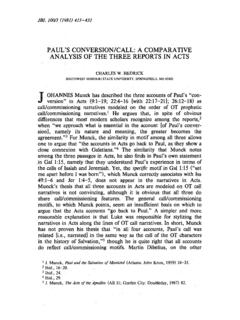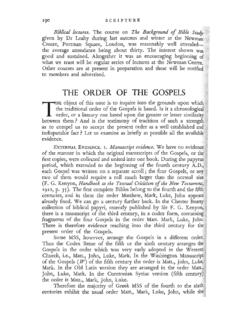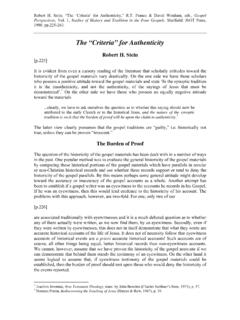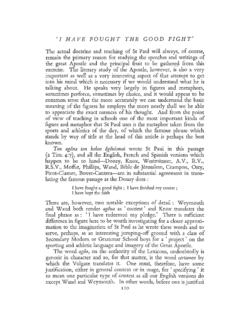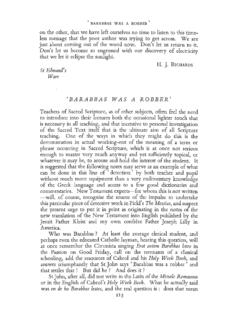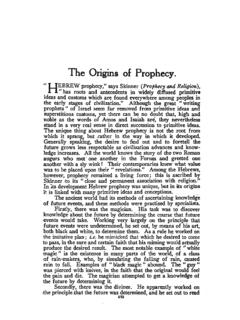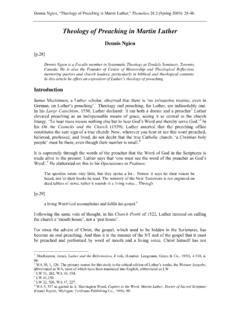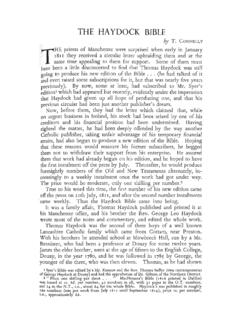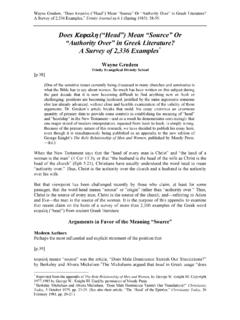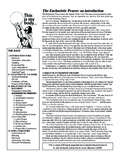Transcription of Christianity Under Claudius - BiblicalStudies.org.uk
1 Bruce, Christianity Under Claudius , Bulletin of the John Rylands Library 44 (March 1962): 309-326. Christianity Under Claudius1 Bruce Rylands Professor of Biblical Criticism and Exegesis in the University of Manchester [ ] I The Emperor Claudius ( 41-54) ought to be twice as well known to readers of the New Testament as any other Roman Emperor, because the New Testament mentions him by name twice, whereas no other emperor is named more than We meet Augustus in Luke ii. 1 and Tiberius in Luke iii. 1, but Claudius appears twice in the Acts of the Apostles once in xi. 28, where we are told of a great famine which broke out in his reign, and again in xviii. 2, where he is said to have commanded all the Jews to leave Rome.
2 It is noteworthy, in passing, that the only New Testament writer who so much as refers to a Roman Emperor by name is Luke; this is one indication of his concern to place the story of Christian origins within the context of world history. Luke s earlier reference to Claudius need not detain us: we know from other sources that his reign was marked by a series of droughts,3 and the particular famine mentioned in Acts was probably that which Josephus places in the procuratorships of Cuspius Fadus and Tiberius Julius Alexander ( between 44 and 48), when Helena, queen-mother of Adiabene and a Jewish proselyte, bought grain in Egypt and figs in Cyprus for distribution to the distressed inhabitants of Since the Church of Antioch at the same time raised a famine-relief fund for the Church of Jerusalem, and entrusted its administration to Barnabas and Pau1,5 the correlation of Luke with Josephus at this point provides us with one approximate Chronological indication for apostolic history.
3 [ ] Luke s second reference to Claudius , however, is much more important. In consequence of an imperial order expelling Jews from Rome, Aquila and Priscilla made their way to Corinth and had not been there long before they joined forces with Paul. An imperial order affecting Jews thus plays its part in the history of early Christianity . And here we should remind ourselves that, while we with our hindsight can distinguish between Jews and Christians as early as the reign of Claudius , no such distinction could have been made at that time by the Roman authorities. For them, Christianity Under Claudius would not have been isolated from the fortunes of the Jewish people throughout the Empire during his reign.
4 Jews and Christians themselves would be aware of the distinction a considerable time before the Roman authorities began to appreciate it a fact which emerges clearly enough from the Gallio incident in Acts xviii. 12 ff., at which we shall look in due course. 1 A lecture delivered in the Library series of public lectures. 2 Nero is referred to as Caesar (Acts xxv. 8 ff.) and Augustus (Acts xxv. 25), but not by his personal name. 3 Cf. Suetonius, Claudius ( assiduas sterilitates ). 4 Ant. iii. 320; xx. 51 ff., 101. 5 Acts xi. 28 ff.; xii. 25 (with Gal. ii. 1-10). Bruce, Christianity Under Claudius , Bulletin of the John Rylands Library 44 (March 1962): 309-326.
5 II The principate of Claudius s nephew and predecessor, Gaius ( 37-41), was a time of anxiety for the Jews, which reached its climax when Gaius gave orders for the erection of his statue in the temple at Jerusalem, so that he might receive divine honours from the Jews as he did from his other This crisis was resolved at the eleventh hour, but it was not soon forgotten. Another critical situation developed around the same time in Egyptian Alexandria, where there had been a large Jewish community practically from the time of its foundation in 332 The long-standing animosity between the Greek and Jewish inhabitants of that city flared up into open violence in 38 and the Jewish community had to endure first a series of vexatious administrative restrictions at the hands of the civic authorities and then brutal outrages at the hands of the city mob.
6 This anti-Jewish activity involved an attack on the special privileges which the Jewish community of Alexandria had long enjoyed, and which had been confirmed by successive Roman rulers. A deputation of Alexandrian Jews therefore went to Rome to make representations to Gaius on behalf of their community, but [ ] received no satisfaction from Claudius , however, when he came to power, issued an edict reaffirming their traditional privileges and directing the Greek and Jewish communities of Alexandria to desist from further strife. This edict is reproduced by Josephus in a form which appears to be substantially But we have a copy of another document from the same period which throws further light on the situation.
7 This is a letter sent by Claudius to the people of Alexandria, published by order of the prefect of Egypt and copied on the verso of a papyrus roll which was acquired by the British Museum in The letter was sent to the Alexandrines in response to an embassy which they had sent to Claudius to congratulate him on his accession, to ask his permission to pay him various honours, and to state the city s case with regard to the recent outbreaks against the Jews. (They probably judged this last matter to be particularly urgent in view of the close friendship which was known to exist between Claudius and Herod Agrippa, king of the Jews.) The letter, as it stands in the papyrus, has no date, but the prefect s preamble is dated Year 2 of Tiberius Claudius Caesar Augustus Germanicus Imperator, 14th day of the month New August.
8 In the letter Claudius deals one by one with the points raised by the embassy of Alexandrines. The section which concerns us contains his reply to their representations about the anti-Jewish excesses in their city. It runs thus: With regard to the question which of the two sides was responsible for the rioting and civil strife or rather, if the truth must be told, the war against the Jews, I am not disposed to pass definite judgment, although your ambassadors, especially Dionysius the son of Theon, pleaded your cause zealously and at length against the other side. But I do reserve irrevocable anger against those who started it again. Now I tell you plainly that if you do not desist from this destructive and obstinate animosity against one another, I 6 Jos.
9 Ant. xviii. 261 ff. 7 Philo, In Flaccum and Legatio ad Gaium; Jos. Ant. xviii. 257 ff. 8 Jos. Ant. xix. 279 ff. 9 See the editio princeps in H. I. Bell, Jews and Christians in Egypt (1924), pp. 1 ff. Bruce, Christianity Under Claudius , Bulletin of the John Rylands Library 44 (March 1962): 309-326. shall be compelled to show what a benevolent ruler is capable of when he is moved to righteous [ ] Therefore I adjure you now once more that the Alexandrines for their part conduct themselves in a considerate and neighbourly manner towards the Jews who have lived in the same city for a long time, and offer them no outrage in the practice of their customary divine worship but allow them to follow their customs as they did in the time of the deified Augustus customs which I too have confirmed after listening to both parties.
10 The Jews, on the other hand, I bid for their part not to agitate for more than they have previously enjoyed, and never again to send two embassies, as though they lived in two separate cities the like of which has never happened before. Moreover, they must not engage in contests for such posts as gymnasiarch or games director, but should rest content with what belongs to them by right and enjoy an abundance of all good things in a city which is not theirs. They must not bring in or invite Jews who sail in from Syria or Egypt; this is the sort of thing which will compel me to have my suspicions redoubled. Otherwise I will proceed against them with the utmost severity for fomenting a general plague which infests the whole world.
